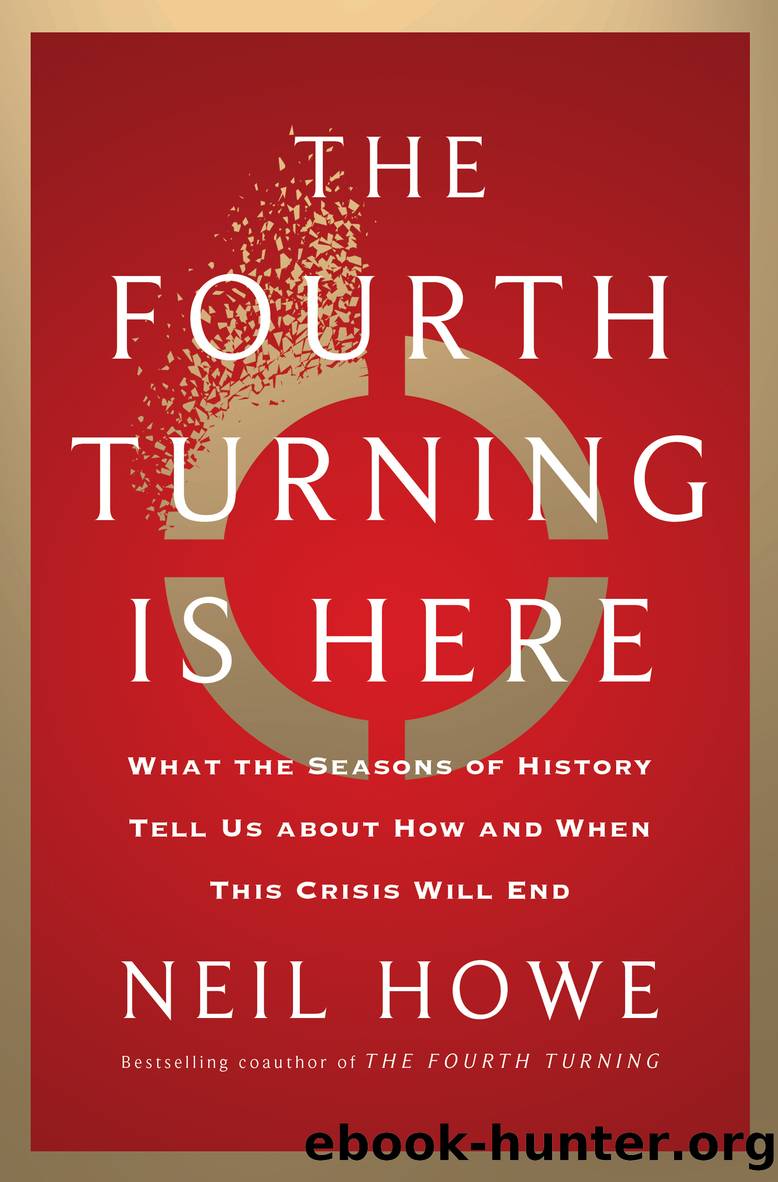The Fourth Turning Is Here by Neil Howe

Author:Neil Howe
Language: eng
Format: epub
Publisher: Simon & Schuster
Published: 2023-07-18T00:00:00+00:00
CONVENTION
It has been said a thousand times. Only adversity can build or reveal true character. Helen Keller put it best: âCharacter cannot be developed in ease and quiet. Only through the experience of trial and suffering can the soul be strengthened, vision cleared, ambition inspired, and success achieved.â What we observe about individuals applies just as well to entire communities. Only in a crisis can a nation discover if it still is a communityâand if so, whether it can function well enough to survive and prevail.
As a Fourth Turning moves toward its climax, citizens come to understand that their personal futures depend entirely on their collective willingness to perform their utmost on one anotherâs behalf. This awareness coincides with a conventional shift in prevailing cultural norms. In its Latin etymology, the word literally means âa coming together.â In popular usage, conventional implies traditional, standard, expected, sanctioned by the group.
During these urgent years, society revalorizes team players, those willing to sacrifice their own interests for their friends, neighbors, and people. Patriotism loses the ironic undertones it gained during the Awakening. The imminent prospect of losing oneâs country quickly rekindles attachment to it. Codes of honor, largely disregarded during eras of peace and affluence, again inspire widespread respectâonce people understand that their own safety depends on those who have sworn to disregard theirs. Heroism re-emerges near the center of public awareness. Heroes are exemplars (often leaders of a group) who bestow great material benefits on their community by dint of extraordinary effort or courageâeven at the cost of their own lives. In other eras, we do not need them. Now we do.
Cultural production pliably adapts to the new mood. With public attention riveted on current events, a blatantly partisan and socially constructive interpretation of events becomes a central mission for writers and artists.
During the American Revolution, virtually every Patriot could recite the fiery slogans of Thomas Paine, the best-known of dozens of pamphleteers who argued passionately about how best to build a virtuous republic. Even the most learned of them could not resist penning lyrics to the patriotic songs for the troops to march by, including John Dickinson (âThe Liberty Songâ) and Dr. Joseph Warren (âFree Americaâ).
During the Civil War, newspapers poured out vitriolâfor or against Abe Lincoln or Jeff Davisâand tony journals featured polemical essays about why the war must be won, by such literati as Ralph Waldo Emerson, Frederick Douglass, and Walt Whitman. By turns rousing and apocalyptic, the memorable songs were designed to inspire people to action: âDixieâ for the South, âBattle Hymn of the Republicâ for the North, and âMany Thousand Goneâ for emancipated slaves.
During World War II, nearly all of Hollywood joined the national propaganda campaign waged against the Axis enemy, from the Three Stooges to Donald Duck. George C. Marshall commissioned award-winning director Frank Capra to produce the seven-hour series Why We Fight. Kate Smith turned Irving Berlinâs âGod Bless Americaâ into a patriotic clarion call after it became the official campaign song for both FDR and his opponent Wendell Willkie in 1940.
Download
This site does not store any files on its server. We only index and link to content provided by other sites. Please contact the content providers to delete copyright contents if any and email us, we'll remove relevant links or contents immediately.
Cecilia; Or, Memoirs of an Heiress — Volume 1 by Fanny Burney(32527)
Cecilia; Or, Memoirs of an Heiress — Volume 2 by Fanny Burney(31928)
Cecilia; Or, Memoirs of an Heiress — Volume 3 by Fanny Burney(31916)
The Great Music City by Andrea Baker(31902)
We're Going to Need More Wine by Gabrielle Union(19020)
All the Missing Girls by Megan Miranda(15892)
Pimp by Iceberg Slim(14464)
Bombshells: Glamour Girls of a Lifetime by Sullivan Steve(14038)
For the Love of Europe by Rick Steves(13823)
Talking to Strangers by Malcolm Gladwell(13332)
Norse Mythology by Gaiman Neil(13317)
Fifty Shades Freed by E L James(13216)
Mindhunter: Inside the FBI's Elite Serial Crime Unit by John E. Douglas & Mark Olshaker(9298)
Crazy Rich Asians by Kevin Kwan(9262)
The Lost Art of Listening by Michael P. Nichols(7480)
Enlightenment Now: The Case for Reason, Science, Humanism, and Progress by Steven Pinker(7288)
The Four Agreements by Don Miguel Ruiz(6729)
Bad Blood by John Carreyrou(6601)
Weapons of Math Destruction by Cathy O'Neil(6248)
